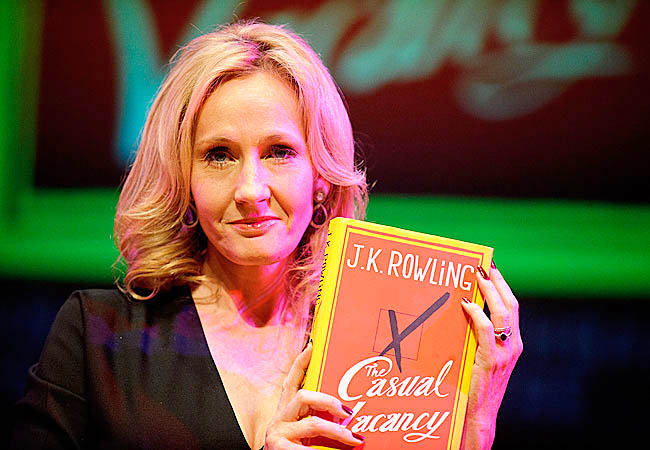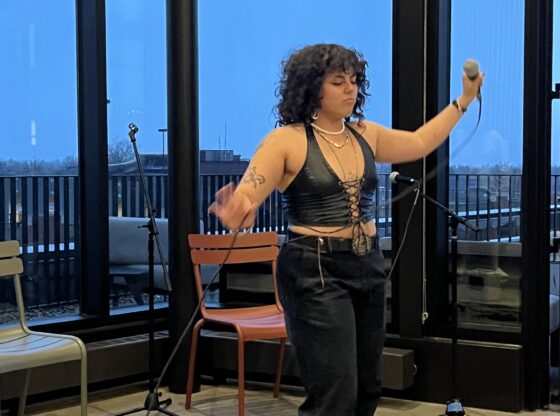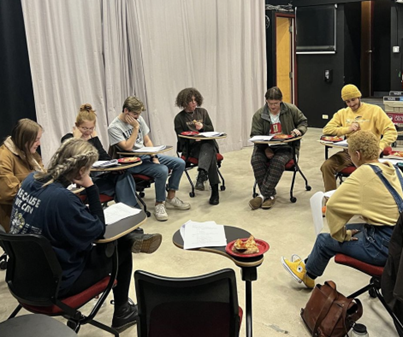
J.K. Rowling’s latest novel, “A Casual Vacancy,” released Thursday, marks her first published novel since the Harry Potter series and the first one targeted exclusively for adults. While the novel does not present a marked departure from Rowling’s previous style, she had certainly made her name as an engaging author post-Potter.
The first few chapters of the book follows the many characters affected – or more accurately, morbidly fascinated – by the death of Barry Fairbrother, an engaging and slightly careless family man who dies of an aneurism – leaving behind a wife, four children and the position as councillor of Pagford, a small district in England.
His death, and the vacancy it leaves behind, creates a flurry of small town gossip that reveals the true “fairweather” nature of his friends and acquaintances.
As characters begin their conquests of the Pagford councillor vacancy, a circus of all-too-serious municipal politicians begin to make the rounds to their alliances in the hopes of being the new councillor.
Enter momma’s boy Miles Molliford and his overly tanned wife Samantha, who hope to ride Barry’s ambulance all the way to the top – but not without the help and constant control of Shirley, Mile’s despicable and manipulative mother and his father Howard, an eccentric and unaffected gastrohome father.
Meanwhile, Gavin Hughes is squashed by his own approaching mortality when his friend Barry’s death, and its implications tear him from his less-than-stimulating affair with Kay – much to the relief of her quiet, surly and beautiful daughter, Gaia.
And amidst the sordid drama of the Pagford aristocrats and golf mates, ordinary Andrew Price is just trying to get through the day as a misfit at school (helped along by his friend Fats), while his submissive mother Ruth and self-satisfied father Simon try to thwart his self-esteem.
As the plot thickens, so does the number of people in the mix, revealing more characters and relationships that unite the various storylines as the book progresses.
Although the story is a departure from the youthful adventures of magic, Rowling can’t seem to escape the bleak, fateful surrealism and crafty cynicism of Hogwarts. Her characters are her usual combinations of ordinary and bizarre, who seem to exist in the realm of “good” or “evil.”
Nothing reveals these obtuse characterizations more than the character’s names. Could Maureen (Mo) be anyone but a sixty-two year old waitress that fancies herself part-pensioner, all-heartbreaker? Take Shirley Mollision of Evertree Crescent, who somehow seems middle-aged, pretentious and spiteful even in name. And who could be a more convincing heroine than Gaia, the new girl on Hope Street?
Readers frustrated with Rowling’s prose will not find any relief in “Vacancy,” which plods along for long sections in the past perfect tense, creating roadblocks of slow, awkward pace with frequent use of “had been able to,” or “would have been able to,” that interrupt the imagery and flow.
Rowling’s voice and British charm are unmistakable, recalling familiar images of “padding” down hallways, “devising” outfits and stinging cuts and “gashes,” that marked the fairytale drama of the Harry Potter series.
These descriptions are most comfortable in their depictions of adolescence – where we know Rowling best. Despite the chaos of the adult world, Andrew, the teenage underachieving “pizza face” with a lustful and unrequited crush at school and a cruel and lewd father at home, naturally inherits the role of the underdog hero, despite the majority of the plot occurring in the adult world around him.
While descriptions of raunchy playground characters and eccentric teachers ring with the same long-forgotten and laughable truths we’ve come to know and love from Rowling, descriptions of more adult themes come off as contrived at best. Descriptions of wrinkly tanned breasts, delayed climaxes and stifled erections seem to come less naturally in Rowling’s serious prose than they might in the slapstick innuendos of Fred and George Weasley.
But whether because of or in spite of Rowling’s style, she keeps readers smiling and pages turning with the simple pleasures of a good story – complete cliffhangers that keep the plot moving, connected and full of surprises. She even catches our hearts with aphorisms that touch on our humanity – even the arrogant Shirley hits on our secret human indulgences:
“She had sat up in bed all those years ago, exactly like this, with sunlight streaming through the ward window, a cup of tea in her hands, waiting for them to bring in her beautiful new baby boy for feeding. Birth and death: There was the same consciousness of heightened existence and of her own elevated importance.”
While Rowling’s characters are a bit flat, and her prose a bit cumbersome, they are awkward and backward in all the moments that make us like them even more. Whether you like it or not, you’ll finish the first few chapters of “A Casual Vacancy” and want to ask your neighbor, “Have you heard the news about Barry Fairbrother?”











